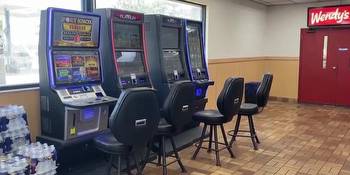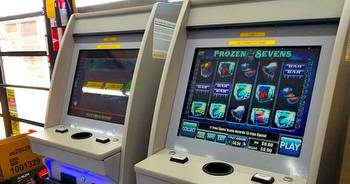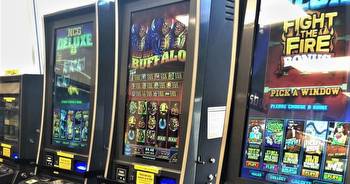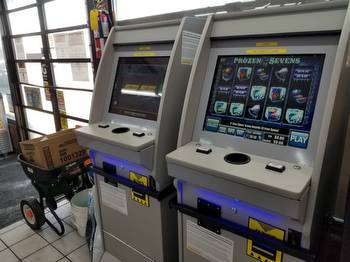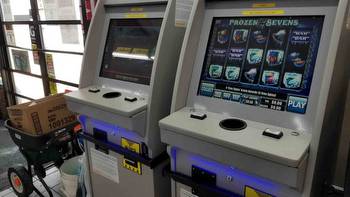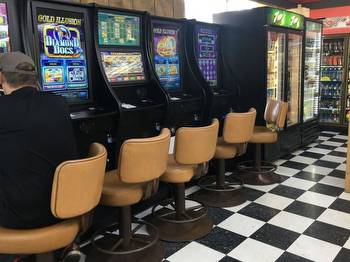Smashed machines put emphatic end on Missouri illegal gambling case
PLATTE CITY – When the bucket of the backhoe came down on the first of five illegal gambling machines destroyed Thursday by court order, it crumpled like a cardboard box being prepped for recycling.
The particle board sides offered no resistance to the pressure, and in about 40 seconds, all that remained was a pile of wood, plastic and electronic shards as the five machines were shattered into thousands of pieces.
“This is a good day,” said Eric Zahnd, Platte County prosecutor. “There is a good reason that the Missouri Legislature said these should be publicly destroyed. It is somewhat about the spectacle of destruction because the legislature wanted to send a message that these machines won’t be tolerated in the state of Missouri. It is a good day.”
The destruction took place at the Platte County Public Works lot, which has plenty of space and lots of heavy equipment suited to the task.
The five machines were seized in 2018 as part of what remains the only completed prosecution of a vendor who offers video games offering a cash prize for placement in convenience stores, truck stops and other locations. Integrity Vending, a Kansas-based firm, was found guilty of felony promotion of gambling in September 2020 and fined $7,500.
But thousands of other similar machines, owned by other vendors, remain in place in the state. Lawmakers have struggled to find agreement on new laws to clearly designate the games as illegal, as heavy lobbying pressure from vendors has blocked their efforts.
The Platte County prosecution showed that no additional laws are needed, Zahnd said before the smashing began Thursday.
“In Missouri, the law is clear,” Zahnd said. “These machines are illegal and they must be destroyed.”
Not every prosecutor agrees.
There have been hundreds of investigations by local law enforcement and the Missouri State Highway Patrol, but a review by The Independent found that many prosecutors are reluctant to file charges and some do not think the games are illegal at all.
The key difference between a casino slot machine and the games destroyed Thursday is that the games have a feature that allows a player to see if their next bet will be a winner or a loser. If it is a loser, the player can withdraw their money, canceling the bet, or change games or wagered amounts in search of a winner.
While Integrity Vending removed its machines from the state, others have not. The most advanced prosecutions of vendors are three felony cases in Linn County. In all, about 24 prosecutions, mainly misdemeanor cases, have been filed since the start of 2019, while estimates put the number of machines being played in the state at 15,000 or more.
Torch Electronics of Wildwood has been the most aggressive in fighting back. The company and Warrenton Oil Company joined together in a lawsuit in Cole County to block the Missouri State Highway Patrol from investigating the games. And in early June, about a month after the latest effort to regulate the games failed in the General Assembly, Torch and Warrenton Oil combined to donate $350,000 to political action committees tied to Steve Tilley, a former House speaker and adviser to Gov. Mike Parson who lobbies on behalf of Torch.
As a result, the machines have been called “gray-market” games, operating in the space between an old-style slot machine, which is clearly illegal, and the regulated games offered on casinos and by the Missouri Lottery.
The machines are syphoning money away from the education programs supported by the lottery and special taxes on casino gambling, said Sen. Dan Hegeman, R-Cosby, who drove to Platte City from his Andrew County home to witness the destruction.
The lottery and casino games are also regulated for fairness, Hegeman noted.
For gambling machines in casinos – slot machines and those that mimic table games like video poker – the minimum return is 80 percent. Typically, the 13 casinos pay out about 90 percent of the money deposited in the machines.
A minimum 45 percent of lottery revenue is dedicated to prizes.
Those protections aren’t in place for the unregulated machines. Hegeman has sponsored legislation that would have prevented any vendor who offers the machines from converting
“I just hope this example will be picked up by the other prosecutors in the state,” he said. “They are not gray-market machines. They are black-market machines.”
The destruction is a satisfying day, said Sgt. Craig Hubbell of the Parkville Police Department, who initiated the investigation that began in October 2018.
“It made the case come to a conclusion, yes,” Hubbell said after looking over the remains of the machines.
The public destruction assures the public that machines won’t go back into use elsewhere, Zahnd said.
“I think there is no question that the reason the law requires them to be destroyed is that we don’t want them back in circulation,” he said. “And again, the law not only requires them to be destroyed but to be publicly destroyed. I think that is a recognition of the special harm that can come from illegal gambling.”









